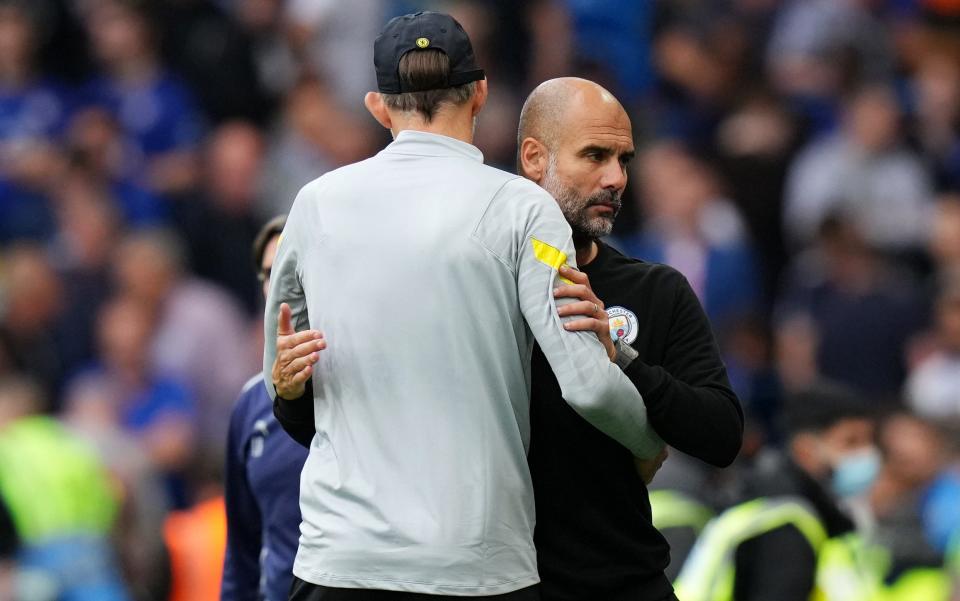Thomas Tuchel pays price for cautious early approach as Pep Guardiola bosses battle of tactical masterminds

You could almost hear the managerial brains whirring at Stamford Bridge, where Thomas Tuchel and Pep Guardiola fizzed around the dugouts like wild-eyed professors watching their experiments unfold. Their hand gestures alone were dizzying enough, with arms crossing and fingers pointing at their players as if communicating in a secret code.
The cynical question to ask is how much the two sets of players really follow these frantic commands, some of which must surely be lost in the heat of battle. But the real proof that Tuchel and Guardiola are operating on a higher plane than most could be seen in their moments of frustration: they do not get angry at passing errors or obvious mistakes, but with those minute details that the casual observer generally cannot see.
There was Tuchel, for example, screaming at Timo Werner for some indiscernible off-the-ball transgression. There was Guardiola, correcting Jack Grealish’s positioning — a couple of yards higher please, Jack — on the left wing while the ball was 50 yards away on the right.
At times in the first half, this drama on the touchline was more gripping than the events on the pitch, which was a rather damning indictment of Chelsea’s execution of Tuchel’s masterplan on the day.
Instead of going sword to sword with Guardiola, an inspiration as well as a rival, Tuchel appeared to raise a tactical shield. As a consequence, Chelsea looked a different side to the one we have come to expect under the German’s management, and not for the better.
Speaking afterwards, Tuchel made it clear that this was a reflection of City’s quality rather than the result of his own approach. Still, though, it was striking to see how defensively Chelsea were playing in those opening exchanges, and it felt fair to ask whether it really needed to be this way for a team of their many qualities.
In his managerial career, Guardiola has lost more games to Chelsea than to any other side, and Tuchel had the possibility here of becoming the first coach to ever win four games in a row against the City manager. It all pointed towards City being vulnerable, as they were in their goalless draw against Southampton last weekend.
To add to that, there was no questioning whether Tuchel had the attacking firepower to go for the visitors. It is not for nothing that Chelsea are considered City’s closest challengers this season, especially since the arrival of Romelu Lukaku, and their recent record against Guardiola’s side was as good a reason as any to have confidence.
Why, then, were they so cautious? Not necessarily in team selection — Chelsea had two strikers to City’s none — but in their attacking intent. From the first minute they sat deep, inviting City to attack and allowing them to have the ball.
Such a strategy is to be expected from lesser teams, those who know they simply cannot compete with City and instead decide to frustrate them for as long as they can, but from this Chelsea side it was surely reasonable to expect a more front-front attitude at home. Their fans certainly seemed to agree, groaning in frustration as the chance to either cross or counter was declined.

Clearly it is not what Tuchel wanted from his players, which is an indication in itself that he had lost the tactical battle. Guardiola’s key tweak was to drop Bernardo Silva into a more deep-lying midfield position, alongside the superb Rodri. The move provided City with a sturdier platform, and appeared to confuse the Chelsea midfield.
Only when Gabriel Jesus scored for the visitors, changing the dynamic of the match, did Chelsea come out from behind their guard. Kai Havertz came on for N’Golo Kante, the 3-5-2 became a more familiar 3-4-3, and suddenly Chelsea looked a bit like Chelsea again.
Just like that, the midfielders were playing into the forwards and following their passes, with Mateo Kovacic almost equalising after using Lukaku as a wall off which to bounce the ball. Havertz began to stretch the opposition by running in behind, and then Ruben Loftus-Cheek arrived from the bench to bring more thrust into the heart of the pitch.
In those moments the match became the sort of affair we were expecting, with both heavyweights swinging punches whenever they could.
Chelsea, crucially, no longer looked overmatched: they had brief periods of dominance in the final quarter, albeit at the expense of their defensive structure. Where was this for the first hour?
Tuchel spoke of an overall lack of “belief” within his team, saying they played as if they had something to lose. Few teams expose those mental fragilities as expertly as City and few managers spot them as easily as Guardiola, who will feel a deep satisfaction at turning the tide in his ongoing duel with Tuchel.

 Yahoo Finance
Yahoo Finance 